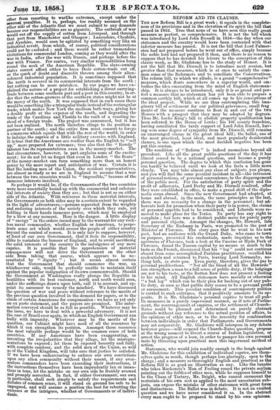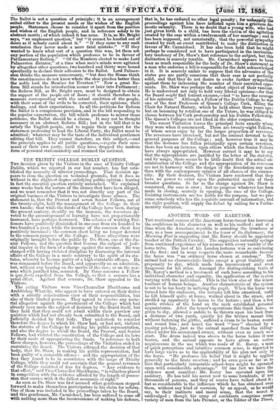REFORM AND ITS CLAUSES.
THE new Reform Bill is a great work ; it equals in the complete. ness of its provisions and in the elevation of its spirit the bill that passed in 1832. True that none of us have seen this really great measure so perfect, so comprehensive. It is not the bill which was intreduced by Lord John Russell in 1834—the day when our statesmen and the country would have been contented with that inferior measure has passed. It is not the bill that Lord Palmer- ston had not prepared before he went out of office, simply because the noble lord had not prepared it then, and there is no reason to suppose that he has devoted his leisure to the conception of this classic work, as Mr. Gladstone has to the study of Homer. It is not the bill that Mr. Disraeli is to introduce next session, but greater than that measure, which is at once to satisfy the com- mon sense of the Reformers and to conciliate the Conservatives. The reform bill, to which we allude, is a grand "comprehensive" measure, which floats somewhere in a superior world, and em- bodies the idea emanating from the mind of English statesman- ship. It is always to be introduced, only it is so grand and per- fect a measure that no statesman has yet been able to prepare a common earthly bill, which at all comes up to his conceptions of the ideal project. While we are thus contemplating this ima- ginary bill of settlement for our political grievances, small frog meats of the measure continue to float in and out of the two Houses with a prospect that they may be adopted by degrees. Thus Mr. Locke King's bill to abolish property qualification has been referred to the House of Lords ; his 101. county franchise, having conciliated the tardy support of Lord John Russell, hav- ing won some degree of sympathy from Mr. Disraeli, still remains an unarranged clause in the great ideal bill ; the ballot, one of the most practical, least ideal, and most popularly desiderated clauses, is one upon which the most decided negative has been put this session.
The condition of " Reform " is indeed anomalous beyond all precedent. Like all the great public questions of the day it has almost ceased to be a national question, and become a purely personal question. The degree to which this confusion has gone can hardly be believed until we look at the facts a little more closely. You may take almost any class of subjects you please, and you will find the same peculiar incident in all—the intrusion of personal notions, of personal convenience, to the disparagement of the public need. For the satisfaction of party spirit and the profit of adherents, Lord Derby and Mr. Disraeh resolved, after they were established in office, to make a grand shift of the diplo- matic corps abroad. Since the new Government had adopted, at home and abroad, in the main, the same 'principles as the last, there was no necessity for a change in the personnel ; but ad- herents look for promotion when their party is in power, the claims of personal appetite had to be considered, and Liberals were re- moved to make place for the Tories. No party has any right to complain ; but here was a distinct public move for purely party and personal objects. Amongst the changes, Mr. Howard, late Secretary of the Embassy in Paris, was promoted to the post of Minister at Florence. The story goes that he went to his new post, had an audience with the Grand Duke, who came to town on purpose, presented his credentials, made inquiries as to the agremens of Florence, took a look at the Casoine or Hyde Park of Florence, found the Tuscan capital by no means so much to his taste as the French, discovered that his " leg" could not continue absent from some accomplished Parisian practitioner, recalled his credentials and returned. to Paris, leaving Lord Normanby, no- thing loth, in statu quo. Even party, therefore, gives the pas to personal predilections. "Not all the blood of all the Howards" can strengthen a man to a full sense of public duty, if the lodgings are not to his taste, or the Rotten Row does not present a footing to his mind. All English statesmen have morally or otherwise " a bad leg" which can be their plea for backing out of any pub- lic duty, so soon as that public duty ceases to be a personal profit or amusement. This peculiar condition of contemporary politics is carried to such extremes, that it positively. amounts to its op- posite. It is Mr. Gladstone's personal caprice to treat all pub- lic, measures in a purely impersonal manner, as if acts of Parlia- ment, the rearrangement of empires, or the settlement of Church- Rates could be planned and determined on purely abstract grounds without any reference to the actual position of affairs, to the opinions of other men, or to the necessity for combination between individuals in order that Parliaments and Governments may act corporately. Mr. Gladstone will interpose in any debate however grave—will suspend the Church-Rates question, propose at the wrong moment to divert a course of Indian legislation, or arrest the progress of a loan, in order to pamper his own personal taste by thrusting upon practical men this impersonal method of action.
Statesmen, who would join readily enough in the laugh against Mr. Gladstone for this exhibition of individual caprice, are them- selves quite as much, though perhaps less glaringly, open to the charge ; and a measure so thoroughly English and practical as the Reform Bill is as good an illustration as any. Like the lunatic who takes Mackenzie's Man of Feeling round the private asylum pointing out the foibles of other men, while he supposes himself to be the Chain of Tartary, Mr. Bright, who cannot surmount the restraints of his own sect as applied to the most unsectarian sub- jects, can expose the mistake of other statesmen with great force and distinctness. The Ballot was in debate. It is not an exalted question and we have never considered it so. In the abstract every man ought to be prepared to stand by his own opinions. The Ballot is not a question of principle ; it is an arrangement suited either to the present needs or the wishes of the English people. Statesmen choose to consider it apart from the position and wishes of the English people, and in reference solely to its abstract merits ; of which indeed it has none. It is, as Mr. Bright says, " an unpleasant question," but " it cannot he hustled out of doors as if nobody cared about it." " If they came to any such conclusion they never made a more fatal mistake." " If they wanted to know what sort of a question this was, let them as any portion of the population which professes to be in favour of Parliamentary Reform." " Of the Members elected to make Lord Palmerston dictator," at a time when men's minds were agitated by altogether other questions, two hundred and thirty were bound specifically to declare their adhesion to the Ballot. Lord Palmer- ston thinks the measure unnecessary, " but does the House think the constituencies do not know where the shoe pinches better than the noble lord the Member for Tiverton?" Now a great Re- form Bill stands for introduction sooner or later into Parliament ; the Reform Bill, as Mr. Bright says, must be designed to obtain the support of the people out of doors ; it should therefore be a measure corresponding with the actual condition of the people, with their sense of the evils to be corrected, their opinions, their feelings, and their expectations. In all the petitions for Reform the Ballot is a conspicuous provision, and in the bill responding to the popular expectation, the bill which professes to mirror those petitions, the Ballot should be a clause. It may not be thought necessary in an abstract Reform Bill ; but in the bill that is to satisfy the English people, and to regain their support for the statesmen professing to lead the Liberal Party, the Ballot must be admitted ; whatever may be the taste of the individual gentlemen editing that bill. They cannot therefore, on this subject,—and the principle applies to all public questions,—regain their com- mand of their own party, until they have dropped the modern form of personal statesmanship and resumed the national.



























 Previous page
Previous page